-
India leads by example: Growing challenge of climate change
- September 12, 2023
- Posted by: admin
- Categories: India, Uncategorized
No Comments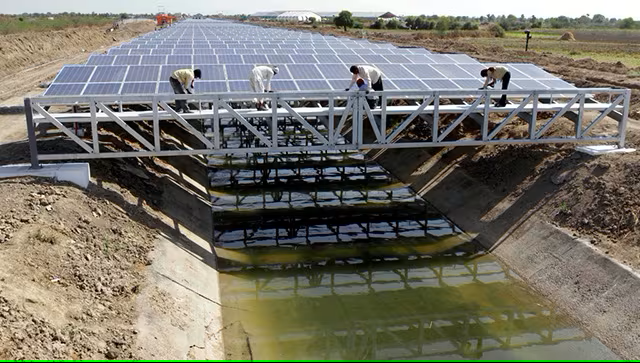
A recent Reuters report confirms that India has managed to cut its greenhouse emissions rate faster
-
Why India’s post-Covid Africa Policy is on a roll
- August 21, 2023
- Posted by: admin
- Categories: India, Uncategorized

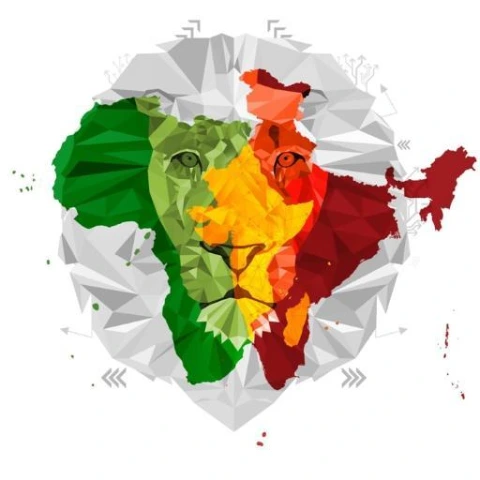
There are evident signs that there has been a marked revival in India’s Africa policy after the hiatus of the pandemic.
-
Theatre Commands and Jointness
- August 20, 2023
- Posted by: admin
- Category: Uncategorized

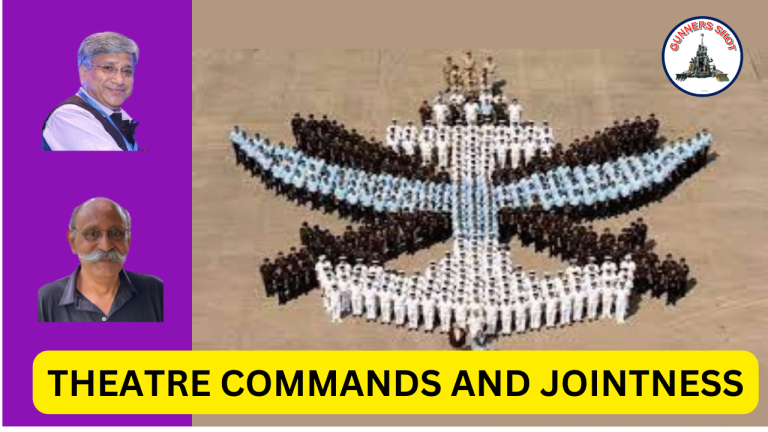
Maj Gen Rajiv Narayanan and I had a very good discussion on theatre commands and jointness.
-
Pakistan, With Head Above The Water : Way The Cookie Crumbles
- July 6, 2023
- Posted by: admin
- Category: Uncategorized

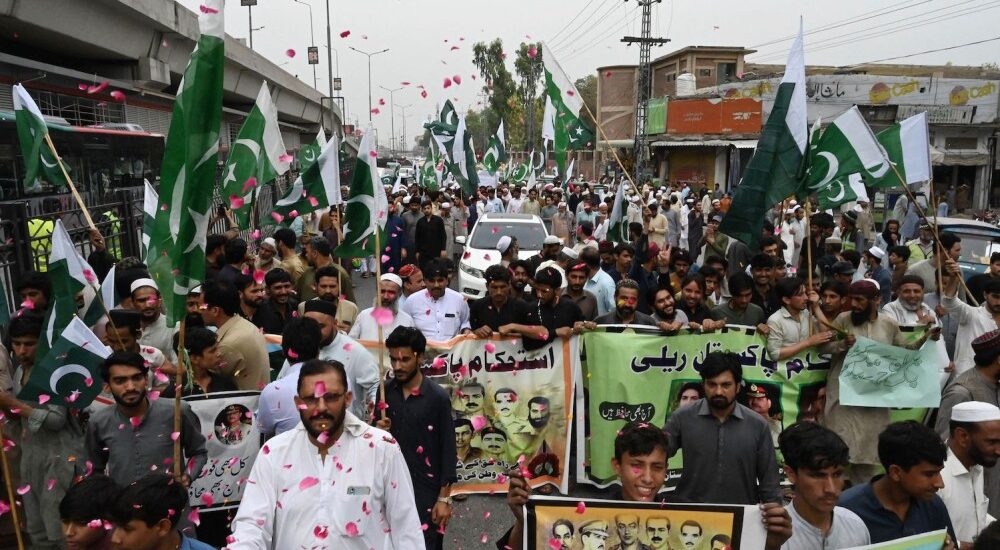
I am becoming increasingly more confident at answering the inevitable question about Pakistan
-
Eight Fronts Confronting China
- July 6, 2023
- Posted by: admin
- Category: Uncategorized

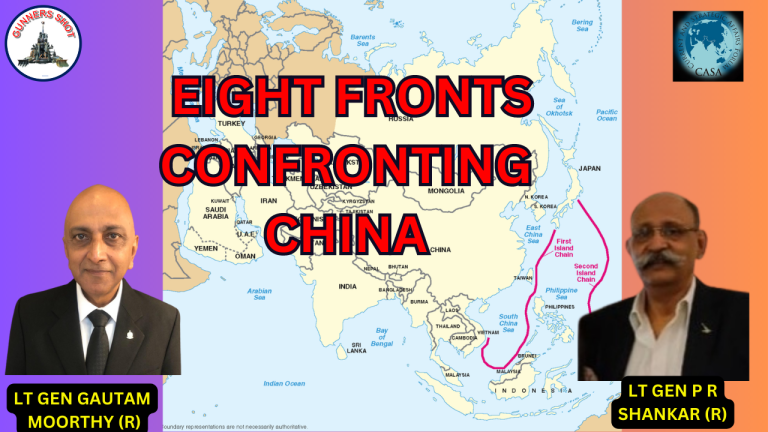
China faces eight fronts now. Four are non military fronts and four are military fronts.
-
RELEASE OF THE KHAN : A DISCUSSION
- June 21, 2023
- Posted by: admin
- Category: Uncategorized

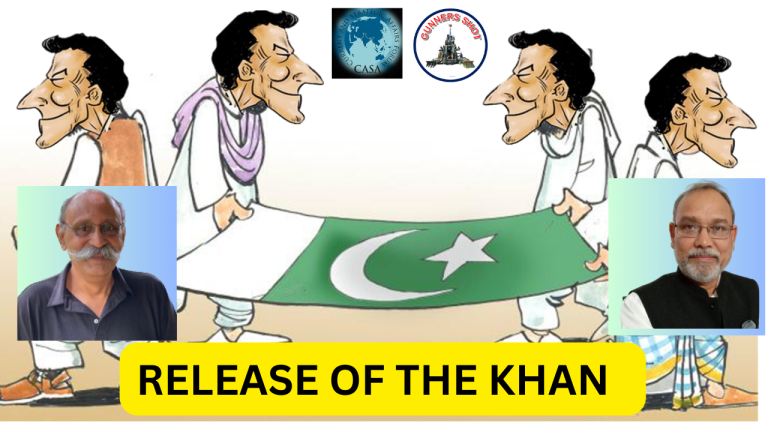
This discussion with Lt Gen Dushyant Singh (R) on Pakistan was at a different level.
-
PAKISTAN ARMY ON THE EDGE ON CASA DIALOGUES
- June 21, 2023
- Posted by: admin
- Category: Uncategorized

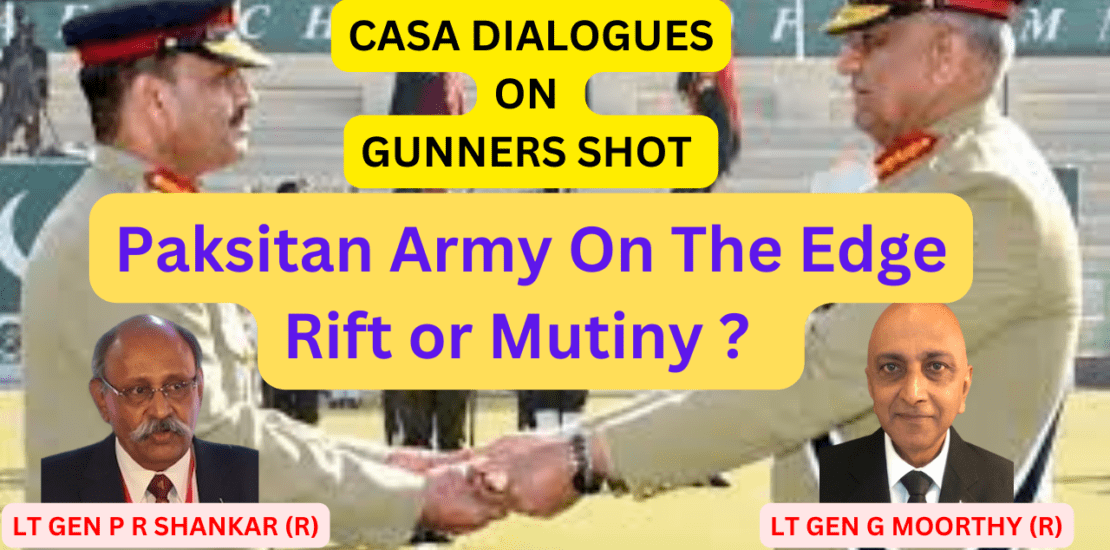
IT S WAS A GREAT START TO THE SERIES ON PAKISTAN WITH GEN GAUTAM MOORTHY
-
Gray Zone Warfare Technology
- May 4, 2023
- Posted by: admin
- Category: Uncategorized


In this video, Maj Gen Rajiv Narayanan(R) and I discussed Gary Zone Warfare and how technology is being used to execute it.
-
A NEW SPRING IN KASHMIR
- April 12, 2023
- Posted by: admin
- Category: Uncategorized

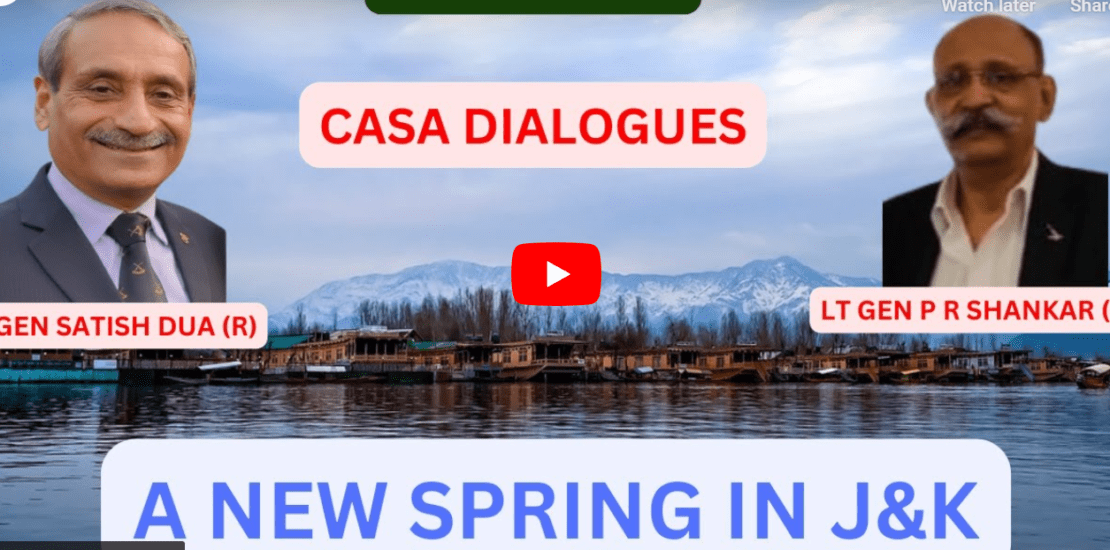
As part of CASA Dialogues, Lt Gen Satish Dua and I had a great discussion about the turn of events in Kashmir and the way ahead. The response from the audience was fantastic. Worth your while to watch. It was satisfying for both of us.
-
The Takeaways of the G20 Foreign Ministers Meet
- April 12, 2023
- Posted by: admin
- Categories: India, Uncategorized
The recently concluded Foreign Ministers meet of the G20 nations held in India failed to arrive at a consensus . There was no joint statement at the end of the events. There is a clear divide between western Nations and Russia plus China over the ongoing Ukraine war. It prevented any joint statement from coming out. Articles have surfaced, specially in domestic and foreign media, which mention that India appears to have failed in its mission to stop G20 countries from calling Russia’s invasion of Ukraine a “war”. This is being extended to term it as a failure of Indian diplomacy and leadership and inability in generating a consensus during the meet. This narrative will be spun by external vested interests, especially China. It will be amplified by internal myopia. The internal myopics will opine that India will not gain anything significant in its tenure of the G20 presidency. In fact, the opposite is the truth. India has already gained significantly from the recently concluded G20 Foreign Ministers meet held in Delhi.
In the fractionized international environment dominated by the Ukraine War, Covid overhang and China’s desire to carve its own international system, India’s centrality and importance has come to the fore. The outcomes of the G20 Foreign Ministers Meet and the Raisina Dialogues need to be understood in its right perspective.
Much is being made internationally about India’s role in supporting Russia and funding the Ukraine War indirectly. India not directly condemning Russia and purchasing Russian oil at deep discounts has been seen as its support for the Ukrainian war enterprise. Accordingly, it is being narrated that India is an unreliable partner for the West. There is no doubt that India and Russia have deep ties. Further India has refrained from blaming Russia directly on the Ukraine War. However Russian Foreign Minister Sergey Lavrov’s attempts to blame the West for the conflict being met with laughter from the audience at the Raisina Dialogues is international news now. Conflate this with the PMs direct “this is not the era of war” message to Putin. It sets the limits to Indo Russian ties. India’s message to Russia and the West is as unambiguous as it gets. Russia’s invasion of Ukraine is not popular amongst Indians who will eventually put limits to these ties in case Russia continues on its path. The West must be made to take notice of this.
India’s purchases of Russian oil are a topic of discussion in USA as it seeks to deny Moscow the revenue needed to fund its Ukrainian adventure. However as per US officials who are monitoring the issue closely, it is good both for the Indian economy and for stabilising oil markets that India is buying crude at deep discounts. Further it actually underfunds the Russian campaign in the long run. See this alongside the laughter at the Raisina Dialogues. India is prepared to see its long term friend through difficult times up to a point and no more. A subtle issue which has cropped up is that Western analysts see China as fully aligned with Russia and warn /accuse it of giving arms to the latter and complicit in the Ukraine War. However in India’s case there is an understanding that its equations with Russia while being complicated are not to the extent of abetment.
The next takeaway from this meet must be the meeting between our EAM and the new Chinese Foreign Minister on the side-lines of the G20 meet. This important sub dialogue must be seen in the larger context. The official view in China is that it “must be prepared to withstand the great test of high winds and even rough seas as it enters a period of strategic opportunities and risks and challenges”. China finds itself boxed in between the West and Russia when it still retains its lofty ambition to carve out an alternative world order. Further the Chinese front door is hardening as the First Island Chain nations are strengthening their defences and entering into cooperative arrangements amongst themselves and USA to ward off China. Simultaneously China’s rear door in Tibet is under some threat from a rising India. Further, China sees India as a ‘swing’ state which can create problems in its global ambitions. China’s ambitions cannot even begin to roll with India, a rising swing state, posing a threat to its rear door. Resultantly, the Chinese posture, off late, has softened, to mend fences with India. Of course, like all things Chinese, they want to mend fences on their terms. The statements and the language from both sides indicate that India is focused on the LAC where it sees ties between China and India had “real problems. On the other hand the Chinese want to talk of everything else but the LAC. Such dissonance will endure. However a move has been made on the Sino Indian chess board during this meet whose significance should not be lost sight of.
India’s importance as a swing state was reinforced by the fact that Russia wants to mediate in easing tensions between China and India. This desire emerged during the course of recent events in Delhi. This is an opportunity, a challenge and an indication of things to come. Very clearly, Russia wants India and China firmly on its side in the current international milieu. Not for any altruistic reasons but for its own purposes. The opportunity is that it provides India a chance to normalise its relations with China. The challenge is that it will be at the cost of India’s growing strategic equations with many western nations. The question is that to what extent can Russia leverage its ties with China and India to bring about a semblance of normality and to what extent will China budge? The enduring reality and challenge will be that India will have to walk the international tight rope till such time it is seen and remains a ‘Swing’ state. The day we can achieve some measure of Atmanirbharta , reduce dependence on Russia for our defences and reduce technological dependence on the West, we will cease to be a swing state and rise on our own.
A major takeaway from this meet is the public evidence of the increasing strength of Indo Australian ties. In the recent past, Australia has been criticised over its decision not to publicly call out India’s refusal tocondemn Russia. Against this backdrop, the Australian Foreign Minister has publicly stated during the meet that both sides are close friends which have a comprehensive strategic partnership and have “regularly” discussed many issues including those pertaining to minority rights and human rights. It was evident that Australia “understands” India’s position on the Russian invasion of Ukraine. This is an important takeaway since it was not far back when the India-Oz ties were characterised by cold frostiness. Further, the visibly increasing partnership augurs well for the prospects of the QUAD. It will do us well to remember that it was Australia which once sunk the QUAD and the reason was its obvious incompatibility with India.
The major takeaway from this meet was the QUAD meeting held on the side-lines of the G20 forum and Raisina Dialogues. It was a reaffirmation of QUAD ties and its growing strength. USA in particular, reiterated its commitment to the QUAD grouping, calling it a “critical vehicle” for engaging Asian nations. It set aside many concerns that USA is distracted by the Ukraine war. The QUAD also announced a new working group to foster greater cooperation on maritime security and engagement with countries in Asia. The four foreign ministers also agreed to step up the QUAD’s partnership with the Indian Ocean Rim Association, a grouping of 23 countries spanning the Indian Ocean. This move is important since some time back China held a meeting of some countries of the Indian Ocean Region in which it excluded India. In fact the growing strength of the QUAD is reflected in the fact that the Japanese foreign minister likened it to the Beatles. The other point of note is that the QUAD has repeatedly stated that it was not “against somebody.” As QUAD reiterates such a stance repeatedly, it only reinforces that the “somebody” is China. Surely “somebody” has heard the tunes of the quartet. It drew a response from China which called it an “exclusionary bloc” amongst other things. The increasing strength of the QUAD must be also seen against the back drop of the increasing resistance which China is encountering in the Western Pacific. The First Island Chain nations along with USA are sharply upping their defences and mutual cooperation to ward off China. Overall China cannot be happy about it at all. It truly must be prepared to withstand the great test of high winds and even rough seas as it enters a period of strategic opportunities and risks and challenges.
A unscheduled but significant meet took place between the foreign minister of Russia and USA’s Secretary of state during the forum. It was the first of its kind since the Ukrainian war began. Nothing much was achieved. A few frosty words were exchanged. However the meeting indicated a need to re-establish in-person diplomatic contacts between USA and Russia. It is an opening to take matters forward by the two governments to discuss the year-old war as well as issues beyond it. Such a meeting could not have taken place without India’s role. It just underlines the importance of India increasing role in global affairs. This must not be lost sight of. Can bigger things happen beyond this? Can India bring about a sense of calm and peace in the international environment?
Look at it any way, India has a lot of take aways from this meet. If one thing has emerged from this meet, it is the fact that India is veering towards the centre of global affairs. In my thinking no major global issue can find a resolution without India’s contribution. That is something which has been underlined in this G20 forum meet. The challenge is to take it ahead from hereon.
